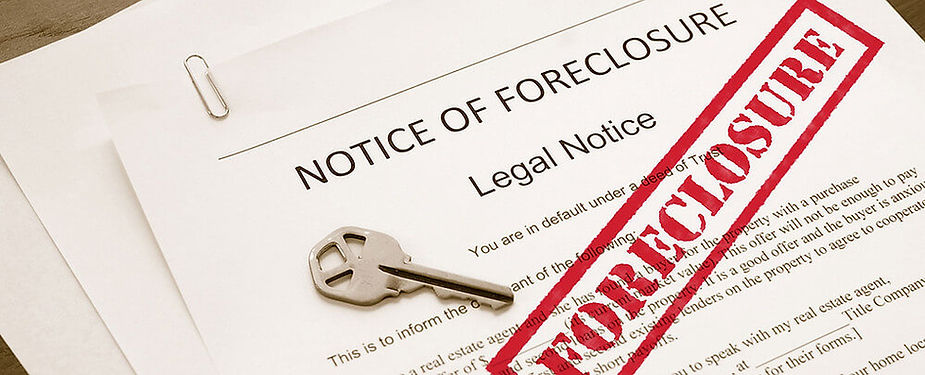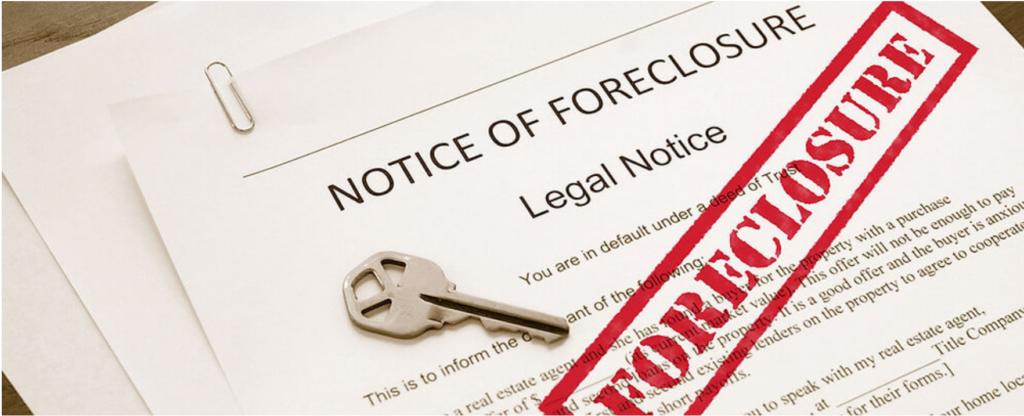Updated: Feb 1
When you first take out a mortgage to buy a home, you are usually certain that you will be able to meet the monthly installments on your home loan. The mortgage provider (like a bank or other financial institution) even goes to great lengths to ensure that the installments will be affordable. They run a credit check and evaluate income vs. expenditure to ensure that sufficient funds are available to repay the mortgage.

However, this is no guarantee that you will be able to afford the installments for the entire term or period of the loan. A job loss, injury, illness, an increase in mortgage payments or multiple other circumstances can occur that result in you no longer being able to pay in full or on time. When you can’t pay, the mortgage provider has the right to foreclose on your home.
But what exactly is foreclosure, how does it work and how can you avoid it even if you can’t afford the repayments?
What Is Foreclosure?
A mortgage is what is referred to as a secured loan. This means that your home stands as security or collateral to ensure that the mortgage provider can recover the full amount of the loan should you default. When you fail to make payments, usually for a period of between 3 and 6 months, the mortgage provider will repossess the house and sell it in order to recover as much of the outstanding loan amount as possible.
This process is referred to as foreclosure.
Other reasons that your property may go into foreclosure include:
– Failure to pay property taxes.
– Failure to pay home owners association fees.
However, what few home owners know is that mortgage providers would prefer to avoid foreclosure. This is because foreclosure can be an expensive legal procedure and they would prefer to continue receiving monthly installments from you or come to some other type of solution to recover the amount of money that is outstanding on the loan.
There are options available to avoid foreclosure:
– Repay the missed installments, interest and other fees.
– Repay the entire outstanding amount on the mortgage.
– Restructure the loan over a longer term to make the installments more affordable.
– Ask for forbearance from your mortgage provider.
– Apply for a government or other mortgage relief programs. These programs will put your mortgage installments on hold for a specified period if you meet the eligibility requirements. Mortgage relief has been specifically made available to homeowners who have been affected by the COVID-19 pandemic.
Selling your house fast is one of the best ways to avoid foreclosure entirely. You have 3 house selling options available to you if you face foreclosure:
– Sell your house and use the proceeds to repay the entire outstanding debt to your mortgage provider. This solution is ideal if the mortgage provider has not yet repossessed the property and there is sufficient equity in the home loan to repay it in full.
– Short sell the property before it can go into foreclosure. A short sale is where you sell the property for less than is currently outstanding on the mortgage. You will need to discuss this option with your mortgage provider in order to determine if they are willing to take the loss.
– Sign over the deed of the property voluntarily to the mortgage provider in lieu of the sale of the property. This releases you from your mortgage obligations until the house is sold. However, mortgage providers seldom accept this proposal unless a short sale has been unsuccessful or if they really want to avoid the legal costs involved with foreclosure.
In each of these instances, you are going to have to sell your house quickly in order to avoid foreclosure. Your mortgage provider isn’t going to wait while you make any repairs or renovations so that you can get a better selling price. They also aren’t going to be patient while your house sits on the market for months on end waiting for the right buyer to come along.
The reality is that the average house takes around 3 months to sell – around 60 days to find a buyer and another month or more to close. Mortgage providers are often not willing to wait around this long before they foreclose. If your house isn’t in perfect condition or you aren’t willing to compromise on the selling price, then it could take much longer for the property to go from “For Sale” to “Sold”.
What you are looking for is a cash buyer so that you don’t have to wait for them to get mortgage approval and speed up the closing process. You also don’t have time (and probably funds) to waste on making costly renovations or necessary repairs so you are looking for a buyer who is willing to put in the additional work.
These type of homebuyers are rare as few people have the capital to purchase a property outright, for cash. Even fewer are willing to invest more money in repairing or renovating homes before they can move in or endure the inconvenience after moving in.
There is an exception and that is a real estate investor.
What Is A Real Estate Investor?

A real estate investor buys properties with the aim to sell them for a profit. This normally mean that they renovate or remodel a home in order to sell if for more than they paid. Commonly, an investor will offer cash to buy a house and will close the deal as quickly as possible so that they can start work on the property and turn it over faster. In the real estate investment industry, this is referred to as flipping houses and the sooner the home is renovated an sold, the greater the profit.
What Are The Benefits Of Selling To A Real Estate Investor?
There are a number of benefits of selling your home to a real estate investor.
– Quick closing. Real estate investors will often make you an immediate offer without ever having viewed the property. Once you accept the offer, they will take care of the paperwork and transfer of the deed. The entire process can take as little as 5 days to complete. This is ideal for homeowners who are facing foreclosure.
– No commission, no fees. An investor isn’t going to charge any commission as they aren’t real estate agents and aren’t providing a service. They are buying your house. They also don’t charge any admin fees, valuation or legal fees.
– No need to repair, renovate or remodel. If you are in the process of foreclosure, there is not time to make any necessary repairs or renovate in order to improve your chances of finding a buyer. Investors aren’t looking for properties that are in good condition but rather properties that they can renovate.
What Are The Downfalls Of Selling To A Real Estate Investor?
The downside is that you aren’t going to get your asking price from the sale. If your home is in foreclosure, you will probably not make a profit but enough to cover the outstanding balance of the mortgage if there is equity available. This is however dependent on the amount of equity available.

The investor will may negotiate a short sale with the mortgage provider. A short sale is where the investor will purchase the property for less than the outstanding amount of the mortgage and the mortgage provider will absorb the loss.
However, this does not mean that you won’t get a fair offer for your property from an investor. When you take into account the savings that you will make from foregoing repairs and renovations, avoiding agents fees and commissions as well as the transfer costs, their offer is often more than fair.
Once your home has been sold to the investor, you should be free and clear of any obligations to your mortgage provider.
Tips For Selling A House In Foreclosure
First and foremost, it is important to act quickly. Homeowners facing foreclosure often think that the situation can be remedied and wait too long. The longer you wait, the more fees and interest you will incur and the more costly the process will become for both you and your mortgage provider.
The moment that your property is listed as distressed or you start receiving legal notices from your mortgage provider, is the moment that you should consider selling.
Don’t waste time repairing and renovating your property or listing and marketing your property for what you think it is worth. Get a settlement figure from your mortgage provider and don’t expect to make a profit on the sale. If you are able to get a buyer who is willing to offer an amount that will cover the entire outstanding amount, consider it a win.
Also keep in mind the long-term consequences of foreclosure. Foreclosure reflects poorly on your credit record and you will find it difficult to apply for loans and credit in the future. It is unlikely that a mortgage provider will consider giving you a loan for years to come.
Foreclosure is not only a stressful event but can also bring forth a whole range of emotions. It is important to put these emotions aside and think with a clear head about what will be best financially both in the short and the long-term. It is recommended that you start the process of selling your house no later than when you are 60 days behind in your installments.
If foreclosure is looming or you have failed to put your house on the market after the process has already started, contact HomeFront for a cash offer to buy your house today.







